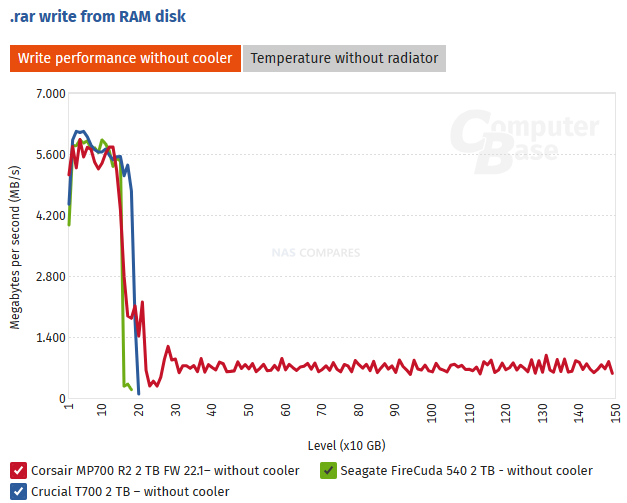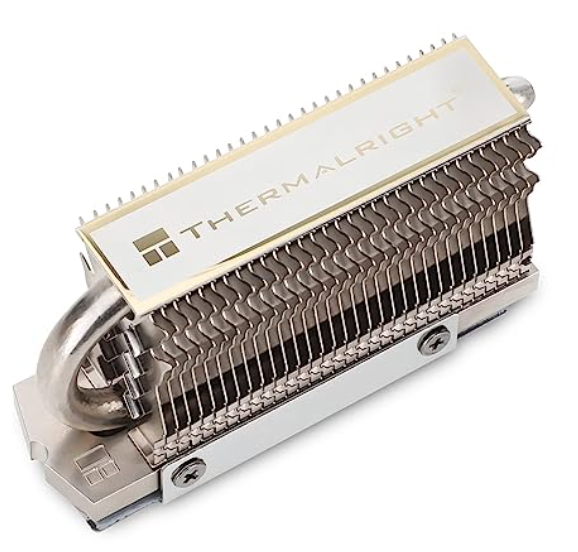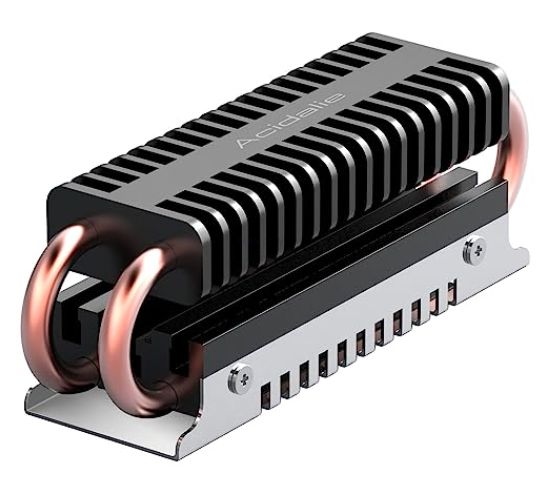Understanding the Heat Issue with Gen5 SSDs and Phison Controller
As the demand for faster data access continues to escalate, manufacturers are pushing the boundaries of Solid State Drive (SSD) technology. However, this leap in speed has come with an unexpected trade-off: heat. Specifically, the latest generation of PCIe 5.0 SSDs using the Phison E26 controller have been reported to overheat and shut down, a problem that several manufacturers are actively working to rectify.
How It All Started
Solid State Drives have been an integral part of modern computing for years. They have continuously evolved, offering significantly faster data access speeds over their predecessor, the traditional Hard Disk Drive (HDD). With the advent of the Gen5 (or PCIe 5.0) SSDs, data access speeds were pushed even further. But these improvements also led to an unexpected problem – heat.
Why Do Gen5 SSDs Get So Hot?
Gen5 SSDs generate more heat due to their increased data transfer speed. Higher data rates often mean higher power consumption, and as power consumption increases, so does heat output. The problem is more apparent with SSDs using the Phison E26 controller. It’s not clear whether this issue is exclusive to the Phison controller or if it is a more general problem with the Gen5 connection.
What Happens When They Reach a Temperature That’s Too Hot?
If the Gen5 SSDs become too hot, they don’t just throttle down their performance, as is typical with most devices when they overheat. Instead, these SSDs completely shut down and are expelled from the system. This sudden shutdown can potentially lead to data loss if the information hasn’t been completely saved onto the memory cells.

The Current Solution and Future Fixes
Phison and SSD manufacturers, including Corsair, have recognized this issue. Corsair, in particular, has released a firmware update for its MP700 Gen5 SSD, which modifies the SSD’s behavior to throttle its performance when reaching critical temperatures, instead of shutting down.
The same firmware update is expected to be adopted by other SSD manufacturers using the Phison E26 controller. Seagate, for instance, has also faced the same issue with their FireCuda 540. Currently, there’s no available firmware update for the FireCuda 540, but Seagate is expected to release it soon.
Other SSD manufacturers like Adata, Gigabyte, and Crucial, which also use the Phison E26 controller, have experienced similar problems. Crucial’s T700, for example, drastically throttles its performance under high load, indicating that it, too, requires an update.
What Can Users Do?
While waiting for firmware updates from their SSD manufacturers, users are recommended to use a cooler for their SSDs, as this could help reduce their operating temperature. However, this isn’t a guaranteed fix, as even “cooled” SSDs can get too hot under certain application scenarios.
Here are few heatsink/ cooler options:



The Impact of High Heat on SSD Lifespan
Heat is a known enemy of electronics, and SSDs are no exception. High temperatures can lead to accelerated wear and tear on the SSDs, effectively reducing their lifespan. Therefore, these overheating issues, if not addressed promptly, can result in quicker degradation of these SSDs.
Are Other Brands Admitting to This Problem?
Yes, a number of brands have admitted to problems with their SSDs. Corsair has been proactive in dealing with the issue, having released a firmware update to fix the problem. Seagate, Gigabyte, and Adata have also acknowledged the problem and are expected to release similar firmware updates.
SSDs that are affected
The SSDs that are affected by the overheating issue due to the Phison E26 controller are:
- Corsair MP700
- Seagate FireCuda 540
- Gigabyte Aorus Gen5 10000
- Adata Legend 970
- Crucial T700
PCIe 5 SSD Timeline
2019-2020
Initial standards for PCIe 5.0 are ratified, leading to speculation about when devices using the new standard will hit the market.
2021
22nd March: Kioxia unveils the second generation of PCIe 5.0 SSDs. Despite this early showcase, broad market availability of Gen5 SSDs remains limited.
3rd August: Crucial P5 Plus with PCIe 4.0 debuts, indicating that many manufacturers are still focused on developing and perfecting PCIe 4.0 technology.
2022
5th January: Phison reveals details about the anticipated SSD controller E26 with PCIe 5.0, hinting that manufacturing companies are actively working towards Gen5 SSDs.
1st November: Japanese retailers hint at high price levels of the first PCIe 5.0 SSDs. This suggests that producing these drives is still a complex and costly process.
2023
4th January: Phison announces new SSD controllers for the enterprise segment, which work with PCIe 5.0, at CES 2023. However, these high-end components are typically not intended for the mass market.
27th January: Team Group announces its intention to launch the fastest consumer SSD with PCIe 5.0. This shows that SSD manufacturers are feeling the pressure to deliver Gen5 SSDs to consumers.
8th March: Microchip introduces the Flashtec NVMe 4016, a “most powerful PCIe Gen 5 NVMe SSD controller”. This launch shows that companies are still perfecting their technologies, potentially causing delays in the mass production of Gen5 SSDs.
20th March: Micron unveils Crucial T700, its first PCIe 5.0 SSD. This marks the entry of PCIe 5.0 SSDs into the consumer market.
14th July: Corsair’s MP700 with PCIe 5.0 is reviewed. Early reviews of Gen5 SSDs start to emerge, and feedback may put pressure on other manufacturers to accelerate their release schedules.
20th July: SSDs with Phison E26, including the Seagate FireCuda 540, show problematic behavior when the temperature is too high. This reveals that in the rush to release, some manufacturers may have overlooked important factors like adequate heat management.
Conclusion
In conclusion, the journey towards faster data access with Gen5 SSDs has indeed encountered a formidable hurdle in the form of overheating issues, particularly with devices using the Phison E26 controller. This heating predicament not only challenges the overall reliability and performance of these high-speed SSDs, but also the user’s data integrity and the longevity of the hardware itself.
However, it’s crucial to understand that advancements in technology often come with unexpected stumbling blocks that manufacturers must overcome. The response from various SSD manufacturers such as Corsair, Seagate, Gigabyte, and Adata, indicates an industry-wide commitment to rectify this problem and refine the performance of Gen5 SSDs. This effort is largely led by firmware updates designed to prevent sudden shutdowns and instead, throttle the SSD’s performance under high temperature conditions.
In the interim, users are advised to monitor their SSD’s temperature, apply cooling solutions, and regularly update their device’s firmware to mitigate the risk of sudden data loss and potential degradation of their SSDs. This situation underscores the importance of active engagement between manufacturers and users, with the latter staying informed about developments and implementing the solutions offered.
Finally, it’s worth noting that despite this hurdle, the evolution of SSD technology continues. This heat issue serves as a lesson to manufacturers and consumers alike about the challenges of pushing the boundaries of technology and the importance of comprehensive testing before releasing new products to the market. As the industry continues to develop and refine Gen5 SSD technology, we can look forward to a future where high-speed data access does not come at the expense of hardware stability and user data integrity.
| Where to Buy a Product | |||
|
|
    
|

|
VISIT RETAILER ➤ |
 |
    
|

|
VISIT RETAILER ➤ |
 |
    
|

|
VISIT RETAILER ➤ |
 |
    
|

|
VISIT RETAILER ➤ |
We use affiliate links on the blog allowing NAScompares information and advice service to be free of charge to you. Anything you purchase on the day you click on our links will generate a small commission which is used to run the website. Here is a link for Amazon and B&H. You can also get me a ☕ Ko-fi or old school Paypal. Thanks! To find out more about how to support this advice service check HERE
Beelink ME Pro NAS Revealed
Best SOLID STORAGE NAS of 2025
Should You Worry About the NanoKVM Hidden Microphone?
Best Cheap NAS of 2025
Minisforum MS-02 Ultra - WHO IS THIS FOR??? (The First 48HRs)
Why People Use TrueNAS, UnRAID and Proxmox to Turnkey NAS (Synology, QNAP, etc)
Access content via Patreon or KO-FI
Discover more from NAS Compares
Subscribe to get the latest posts sent to your email.






DISCUSS with others your opinion about this subject.
ASK questions to NAS community
SHARE more details what you have found on this subject
IMPROVE this niche ecosystem, let us know what to change/fix on this site